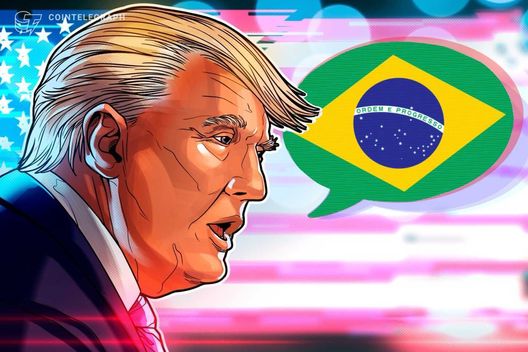
Brazil's Pix payment system has been gaining traction as a convenient and efficient way for Brazilians to make transactions. The system, developed by the Central Bank of Brazil, allows users to make instant payments 24/7, reducing the reliance on traditional banking methods and payment processors. With its popularity rising, Pix has been seen as a potential game-changer in the country's financial landscape.
In a broader context, the BRICS (Brazil, Russia, India, China, and South Africa) nations have been exploring the idea of creating a reserve currency to reduce their dependence on the US dollar in international trade. This move could potentially shift the global economic power dynamics and provide more stability for these emerging economies.
However, recent developments have added a layer of complexity to these advancements. Former US President Donald Trump has responded to these initiatives with a 50% tariff on Brazilian goods and initiated a sweeping trade investigation. This move by the US administration could have significant implications for Brazil's economy and its efforts to strengthen its financial systems.
The imposition of tariffs by the US could hinder Brazil's economic growth and disrupt its trade relationships with one of its key trading partners. The uncertainty created by these actions could also deter foreign investors and impact the country's financial stability.
Moreover, the trade investigation initiated by the US raises concerns about the future of Brazil's trade policies and the potential challenges it may face in the global market. The investigation could lead to further trade restrictions and barriers for Brazilian businesses, affecting their competitiveness and growth prospects.
The timing of these actions by the US, amid Brazil's efforts to enhance its financial infrastructure and explore new avenues for economic cooperation with other BRICS nations, adds another layer of complexity to the situation. It highlights the challenges faced by emerging economies in navigating the global economic landscape and the interplay of geopolitical factors in shaping their economic policies.
As Brazil continues to expand its Pix system and explore opportunities for collaboration with other BRICS countries, the impact of the US tariffs and trade investigation will be closely watched. The outcome of these developments could have far-reaching consequences for Brazil's economic future and its efforts to strengthen its position in the global economy.
In conclusion, the intersection of Brazil's Pix system expansion, BRICS' reserve currency discussions, and the US response through tariffs and trade investigations underscores the complexities of the global economic landscape. The outcome of these developments will not only shape Brazil's economic trajectory but also have broader implications for international trade and financial cooperation among emerging economies.

Leave a Reply